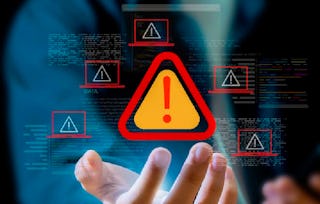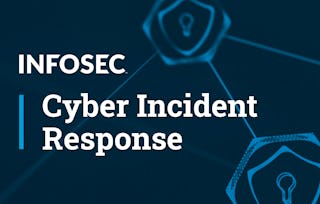This course aims to provide participants with a comprehensive understanding of incident response processes and workflows. The course covers various aspects of automating incident response mechanisms, including centralizing and automating operations, scaling the alert management process, and advanced topics such as correlation, impact assessments, and security use cases showcasing the end-to-end lifecycle of an incident.

Automated Cyber Security Incident Response
Ends soon: Gain next-level skills with Coursera Plus for $199 (regularly $399). Save now.

(69 reviews)
Skills you'll gain
- System Monitoring
- Anomaly Detection
- IT Automation
- Continuous Monitoring
- Intrusion Detection and Prevention
- Event Monitoring
- Risk Management Framework
- Incident Management
- Automation
- Incident Response
- Cybersecurity
- Computer Security Incident Management
- Cyber Threat Intelligence
- Security Controls
- Data Analysis Software
- Security Information and Event Management (SIEM)
- Threat Detection
Details to know

Add to your LinkedIn profile
16 assignments
See how employees at top companies are mastering in-demand skills

There are 4 modules in this course
Module 1 provides a foundational understanding of automated incident response, emphasizing its pivotal role in modern cybersecurity. Participants delve into core incident response concepts, recognizing their significance in contemporary practices. The module elucidates the critical role of automation in security operations and incident response, elucidating the seamless process flow. By the end, learners will grasp the fundamentals, enabling them to appreciate the strategic importance of automation in fortifying cybersecurity defenses and responding effectively to emerging threats.
What's included
9 videos5 readings4 assignments1 discussion prompt
In this module, get familiar with incident management tools and detection techniques. Explore the extensive features and capabilities offered by various tools, which position them as a prominent industry solution. Leveraging Threat Intelligence for Automated Triage, Data Collection, and Advanced Analysis Techniques. Learn how to implement machine learning and AI in incident triage and its basic functionality. Interact with the interface to create playbooks for automated triage and response.
What's included
8 videos3 readings4 assignments1 discussion prompt
Module 3, "Data Collection and Management," immerses participants in essential techniques for ingesting, organizing, and managing incidents. Through understanding of major incidents, learners gain valuable insights, fostering a culture of continuous learning. The module empowers participants to create and curate timelines of activity, facilitating ongoing process improvement. By honing skills in efficient data handling, learners are equipped to navigate incident response with precision, ensuring comprehensive incident understanding, and contributing to the enhancement of organizational cybersecurity protocols.
What's included
9 videos3 readings4 assignments1 discussion prompt
Module 4 introduces learners to the foundational skills of constructing searches, filtering, data transformation, aggregation functions, and result visualization. This knowledge forms a robust foundation for extracting valuable insights and conducting effective data analysis within automation tools. Empowered with these skills, participants are well-equipped to anticipate and adapt to future trends in cybersecurity. The module's focus on data manipulation ensuring that learners not only comprehend the essentials of data analysis but also possess the capabilities to leverage automation tools, fostering their ability to proactively address emerging challenges in the evolving landscape of cybersecurity.
What's included
10 videos3 readings4 assignments1 discussion prompt
Explore more from Security
 Status: Free Trial
Status: Free Trial Status: Free Trial
Status: Free TrialInfosec
 Status: Free Trial
Status: Free TrialInfosec
 Status: Free Trial
Status: Free Trial
Why people choose Coursera for their career




Learner reviews
69 reviews
- 5 stars
88.40%
- 4 stars
4.34%
- 3 stars
1.44%
- 2 stars
1.44%
- 1 star
4.34%
Showing 3 of 69
Reviewed on Apr 20, 2025
Efficient, fast, and reliable solution for handling cyber threats automatically.
Reviewed on Mar 19, 2024
For those looking to obtain certification in automated incident response this course serves as an excellent preparation resources.
Reviewed on Oct 12, 2025
Learners strengthen threat detection, optimize response workflows, and develop essential skills for effective and efficient cybersecurity incident management.
Frequently asked questions
To access the course materials, assignments and to earn a Certificate, you will need to purchase the Certificate experience when you enroll in a course. You can try a Free Trial instead, or apply for Financial Aid. The course may offer 'Full Course, No Certificate' instead. This option lets you see all course materials, submit required assessments, and get a final grade. This also means that you will not be able to purchase a Certificate experience.
When you purchase a Certificate you get access to all course materials, including graded assignments. Upon completing the course, your electronic Certificate will be added to your Accomplishments page - from there, you can print your Certificate or add it to your LinkedIn profile.
Yes. In select learning programs, you can apply for financial aid or a scholarship if you can’t afford the enrollment fee. If fin aid or scholarship is available for your learning program selection, you’ll find a link to apply on the description page.
More questions
Financial aid available,






